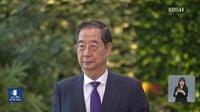The political landscape in South Korea has been shaken by the ongoing investigation into Han Deuk-su, the former Prime Minister, who now faces allegations related to his involvement in a controversial martial law declaration. Over the past week, Han has undergone a series of intense interrogations by a special investigation team, with the possibility of an arrest warrant looming—a move that would mark a historic first for a former South Korean prime minister.
It all began on August 19, 2025, when Han Deuk-su arrived at the Seoul High Prosecutors’ Office for questioning regarding his role in the declaration of martial law. According to The Hankyoreh, Han initially claimed that he had no recollection of receiving the martial law proclamation document from then-President Yoon Seok-yeol. This statement echoed similar testimony Han gave in February before the National Assembly, where he insisted, “I was not aware of the existence of a martial law proclamation until the Cabinet meeting to lift martial law. Later, I found out it was in the back pocket of my suit.” During the impeachment trial of President Yoon, Han further testified, “I really do not remember when or how I received the martial law proclamation.”
However, the tide began to turn after investigators presented CCTV footage from the presidential office, which appeared to show Han reviewing documents on the night martial law was declared. Pressed by the special investigation team, Han altered his stance. As reported by MBC News and KBS News, Han admitted, “I received the martial law proclamation from former President Yoon.” This reversal has fueled speculation that Han’s change in testimony might be a calculated move to avoid arrest, with some analysts suggesting he’s trying to demonstrate a lack of intent to destroy evidence—a key condition for detention under South Korean law.
The investigation, led by Special Prosecutor Cho Eun-seok’s team, has been relentless. On August 22, Han was summoned for a third round of questioning, which stretched over thirteen hours into the late evening. Emerging from the session just before midnight, Han declined to answer reporters’ questions, including pointed ones such as, “Why did you change your testimony?” and “What do you think about the special prosecutor possibly requesting an arrest warrant?”
During this marathon session, prosecutors focused on whether Han merely abetted or actively participated in the martial law decision. They scrutinized his actions on the night martial law was declared, particularly his role in hastily convening a Cabinet meeting and ending it within five minutes, despite several ministers not yet being present. Investigators also examined Han’s communications with then-ruling party floor leader Chu Kyung-ho and former Culture Minister Yoo In-chon, probing whether Han was relaying direct instructions from President Yoon.
According to KBS News, Han has maintained that he “actively opposed the declaration of martial law.” Yet, prosecutors have uncovered evidence suggesting his involvement was more substantial than he previously acknowledged. The investigation team is now seriously considering seeking an arrest warrant for Han on charges of aiding and abetting insurrection—a charge with grave implications. If approved, Han would become the first former prime minister in South Korean history to face a judicial review for pretrial detention on such charges.
The origins of this high-stakes inquiry trace back to allegations of a so-called “family inheritance dispute”—a term that has become shorthand for the internal government struggle over the legitimacy of the martial law proclamation. Han has consistently denied the authenticity of this dispute, telling investigators, “There was no genuine family inheritance dispute,” and attributing the controversy to testimony from a special investigator named Shin. He further asserted that no direct evidence supporting the existence of a dispute has been found, with the investigation relying largely on Shin’s statements and CCTV footage.
The special investigation team, undeterred by Han’s denials, has continued to amass evidence, reviewing hours of security footage and interviewing multiple witnesses. As of August 23, the probe remains active, with investigators still piecing together the events of that fateful night and Han’s exact role. Prosecutors are reportedly weighing whether to file for Han’s arrest as early as this weekend.
The case has drawn widespread attention, not just for its legal ramifications but also for its political undertones. Han’s shifting testimony has prompted speculation about his motivations and the broader implications for South Korea’s political elite. Some observers see his admissions as a tactical move to avoid detention, while others argue that the special prosecutor’s aggressive pursuit signals a new era of accountability at the highest levels of government.
Throughout the investigation, Han has attempted to distance himself from any wrongdoing. He has repeatedly stated, “I did not receive any family inheritance dispute documents,” and has insisted that the entire controversy is based on misunderstandings and misinterpretations. Nonetheless, the special investigation team remains skeptical, with lead prosecutor Park Ji-young emphasizing that “the most significant theme is whether Han was involved in the insurrection. Whether he acknowledges this is of crucial importance.”
As the investigation continues, questions abound. Will the special prosecutor’s office ultimately seek Han’s arrest? If so, how will this unprecedented move reshape public perceptions of political accountability in South Korea? And what might it mean for the legacy of President Yoon and his administration?
While the answers remain uncertain, one thing is clear: the investigation into Han Deuk-su has become a defining moment for South Korea’s democracy, testing the nation’s commitment to transparency, the rule of law, and the principle that no one—no matter how high their office—stands above scrutiny. As the case unfolds, the country watches closely, keenly aware that history is being written in real time.
![[단독]특검, 한덕수 전 총리 ‘내란 우두머리 방조’ 혐의 구속영장 청구 방침](https://thumbor.evrimagaci.org/iHZAoybGBPVjCc9bKkNva_mdqSA=/200x0/tpg%2Fsources%2Fb6274bb5-b2a7-48b9-b78e-0cd8bfbb2059.jpeg)

